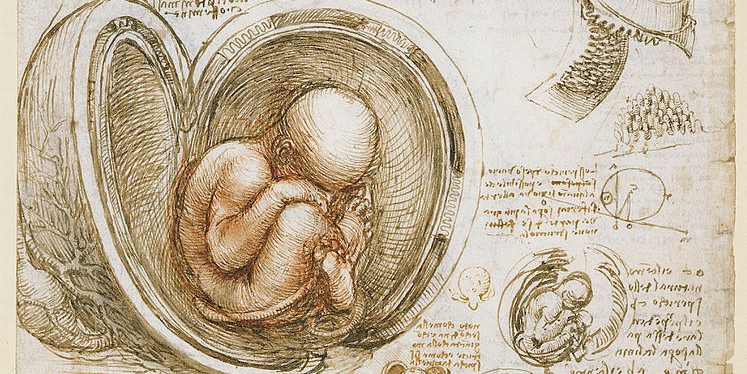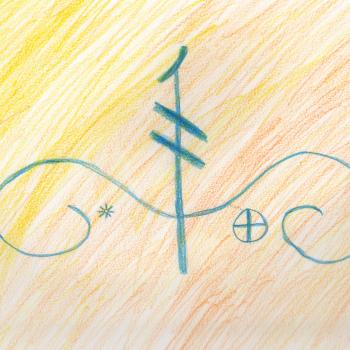I was recently browsing the sale table at Red Emma’s, Baltimore’s worker-owned radical bookstore and vegetarian restaurant (every town should have one) when I came across Ibn al-Rawandi’s Islamic Mysticism: A Secular Perspective. (“al-Rawandi” seems to be a pseudonym, borrowed from a ninth century skeptic.) I only glanced through it but it reminded me in tone of dozens of internet posts I’ve seen from “newborn” atheists reveling in their newfound freedom to question dogma, factual enough but not yet grown into a mature perspective that allows a deep investigation of the nature of religion. (I may have made such a post or two myself in years long gone by.)
I may pick up a copy of the book at some point; we Americans could all use a little education about Islam and this book might (or might not) be a good launching point for that. I have only a quick glance to judge by. But there is one passage I saw that goes beyond criticism of Islam and Sufism (justified or not) into a general claim that I thought needed a refutation:
For an intelligent, educated Westerner to convert to Islam is an act of mental suicide, a self-conscious infantilism born of the willful ignorance that refuses to look facts in the face, the adult equivalent of the rebellious teenager seeking a way to offend by choosing the antithesis of his or her parent’s cultural values. The choice between Islam and the critical skepticism that has made the modern world is a choice between a return to the womb, the essence of the mystical experience, and going forward into the future without guide or refuge; if courage is the first of the virtues, the explorer has more than the stay-at-home. [emphasis added][al-Rawandi, 195]
This idea that the mystical experience is about a “return to the womb” is entirely inaccurate. It is not a contraction and a retreat; it is instead an opening to the whole of the Cosmos.

One of the best explanations of the mystical experience is in a D.H. Lawrence poem titled, simply, “Mystic”, in which he wrote:
They call all experience of the senses mystic, when the experience is considered.
So an apple becomes mystic when I taste in it
the summer and the snows, the wild welter of earth
and the insistence of the sun.Lawrence
The mystic sense is the perception of the beauty of the interconnected and transpersonal. To see in that apple the seasons, the sun and the earth; to see, as Blake said, the whole world in a grain of sand; to look at a passing stranger, a tree in the median strip, the starry heavens, and see one’s own self there. Not just in an intellectual sense, although it’s important to note that the intellectual, objective, scientific perspective tells of this same interconnection, that all that exists was originally one tiny and dense whole, that every atom in your body and mine pull on each other with gravitational and electromagnetic force, not to mention the biological and chemical cycles that unite us; but on the gut emotional and spiritual (to use a dangerous word) level, a glimpse past the useful fiction of separateness that the mind spins.
The opening of Carl Sagan’s book Cosmos says:
The Cosmos is all that is or ever was or ever will be. Our feeblest contemplations of the Cosmos stir us—there is a tingling in the spine, a catch in the voice, a faint sensation, as if a distant memory, of falling from a height. We know we are approaching the greatest of mysteries.[Sagan, 4]
That tingling, that faint sensation of mystery — that is the mystic sense. It is not a thing found in a retreat to the passivity of the womb.
al-Rawandi speaks of courage somehow being the opposite of the mystical, but it takes courage to face the untempered direct mystical experience. That is the province of the shaman rather than the priest. As Joseph Campbell put it:
The creative researches and wonderful daring of our scientists today partake far more of the lion spirit of shamanism than of the piety of priest and peasant….And if we are to match their courage, and thus participate joyfully in their world without meaning, we must allow our own spirits to become, like theirs, wild ganders, and fly in timeless, spaceless flight…not into any heaven beyond the firmament (for there is no heaven out there), but to that seat of experience, simultaneously without and within, where Prometheus and Zeus, I and the Father, the meaninglessness of the sense of existence and the meaninglessness of the meanings of the world, are one. [Campbell, 192]
It may be that what al-Rawandi found in his explorations was the passive piety of the priest rather than the “lion spirit” of the shaman. (There is not necessarily a complete disconnect between the two, though organized and politically powerful religion does push that way.) But if his teachers showed him a mysticism that was a retreat rather than an advance, a closing rather than an opening, then he was given a counterfeit. It’s a sad thing if a religion or wisdom path — be it Islam or Christianity or Paganism or Buddhism — offers a weak and false experience; but it does not sully the beauty of the real thing in the least.
But also, it is also a sad thing if a religion offers a genuine mystical experience but then claims it as proof of some bit of dogma. If someone can teach you to taste the summer in an apple, it does not mean that any story they tell you about apples is therefore true.
References
al-Rawandi, Ibn. Islamic Mysticism: A Secular Perspective. (Amherst, N.Y: Prometheus Books, 2000.
Campbell, Joseph. The Flight of the Wild Gander. New York, N.Y: HarperPerennial, 1990.
Lawrence, D.H. “Mystic.” The Complete Poems of D.H. Lawrence. Wordsworth Poetry Library, 1994. p 594
Sagan, Carl. Cosmos. New York: Random House, 1980.
You can keep up with “The Zen Pagan” by subscribing via RSS or e-mail.
Details TBD, but I’ll be speaking at the Firehouse Arts & Music Meet & Greet at the Windup Space in Baltimore on October 21. If you’re local come by, there are going to be some great performers and speakers, and this new space promises to be a great project.
If you do Facebook, you might choose to join a group on “Zen Paganism” I’ve set up there. And don’t forget to “like” Patheos Pagan and/or The Zen Pagan over there, too.













